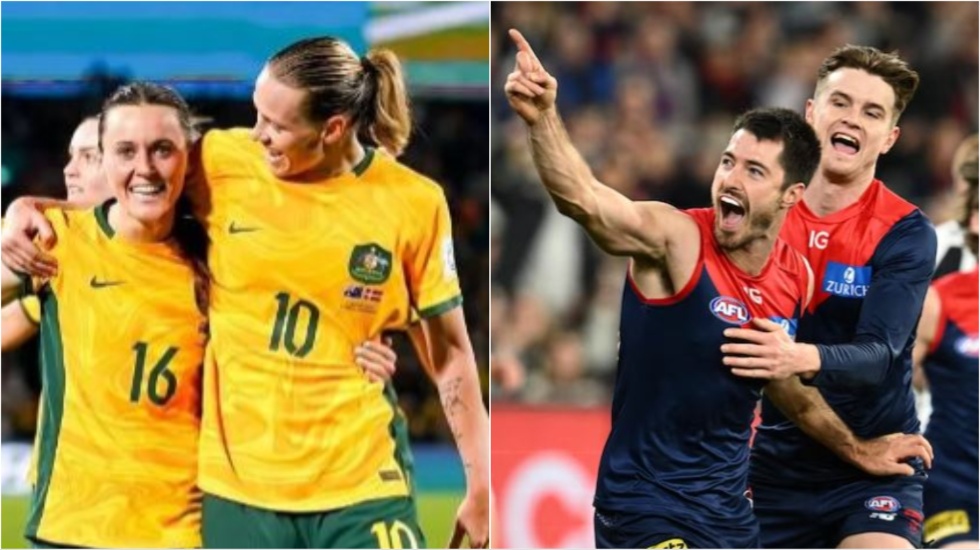The Matildas’ World Cup quarter final will be on the MCG scoreboard before Melbourne plays Carlton on Saturday night.
It’s about just five extra minutes and the accessibility of a TV screen, but in terms of the bigger Australian sporting and cultural picture, it matters a great deal.
Yes, we’re talking about the AFL’s decision to push back the start time of Saturday night’s Carlton-Melbourne clash at the MCG from 7.25pm to 7.30 in conjunction with screening the Matildas’ FIFA Women’s World Cup quarter-final clash against France live on the scoreboard.
Why is it so significant? Because it signals a concession from the AFL that it can no longer afford to either ignore or on occasion even deliberately spite the game of soccer (yes, we’re calling it that here for differentiation.
It’s an acknowledgement that these past few weeks and the surge of support for the Matildas really has tapped into something special within the community which the indigenous game simply cannot afford to antagonise.
It’s an acknowledgement that in 21st century Australia, there are now significant amounts of people who love and follow passionately the fortunes of their preferred teams in either sport, and in the case of soccer, their country, too.
And hopefully, also, it’s a gesture signaling a desire to help end the infantile “code wars”, the seemingly never-ending slanging match primarily between ardent followers of soccer on one side and Australian football on the other, that continues to plague social media in particular.
Even writing these words, I can already see the eye rolls of the most partisan and narrow-minded followers of either game in Australia.
They’ll bring up (and rightly so) the AFL’s petty and frankly immature decision last December to release the 2023 fixture at the precise time the Socceroos were playing Argentina for a spot in the World Cup quarter-finals.
They’ll speak of the various backhanders the AFL has dealt over the years, seemingly reveling in any backward step the world game may have taken in this country.
More blinkered Aussie Rules fans will point out in response that soccer in this country has often been its own worst enemy, driven by petty, parochial self-interest and in-fighting at an administrative level, failing to market the game well enough.
If you inhabit social media space, you will have seen the two groups going at each other like some sort of Punch and Judy puppet show. Which is tedious in the extreme to those of us who love both games. And which is really the point here. Because that group continues to grow, vastly outnumbering the zealots who seem to believe you can’t love one code without hating the other.
That “something special” about the Matildas to me seems increasingly obvious, too, and also significant. It’s about inclusion. Of a wider array of cultures. Of a wider array of preferences of sexuality. Of people who have traditionally felt ostracized from participating in sport, even as a barracker, because they were ridiculed and marginalized by those who’d use sport as a means of bullying.
And what of those who’ve helped, perhaps even unwittingly, to drive that exclusion, not just of those from non-traditionally “sporty” backgrounds, but lovers of supposedly “rival” codes?
PLEASE HELP US CONTINUE TO THRIVE BY BECOMING AN OFFICIAL FOOTYOLOGY PATRON. JUST CLICK THIS LINK.
Is that even all their own fault? Perhaps not. Because the cultural and media influences which have shaped those attitudes have existed a long time, and been unrelenting in their sometimes subtle but often quite overt discrimination.
I’ve been a football (of all sorts) nut since I was a little kid. I hooked into Aussie Rules and soccer at around the same age, watching both on TV religiously. I played the former for my school and the latter with a club full of kids of South American descent, where I was practically the only Anglo-Saxon.
In hindsight, I was incredibly fortunate to have that sort of exposure outside the very white, very middle suburban space Aussie Rules occupied for so long when I was growing up.
As much as I lived and breathed the indigenous code, even as a kid I often felt embarrassed by how narrow-minded the game (or Australian culture generally) could be, even to “outsiders” who embraced it.
Coincidentally, the other night I watched an old VFL highlights package (from the mid-1980s) in which the entire “World of Sport” panel dissolved into hysterics when one of its revered panelists referred to then-North Melbourne player and later AFL chief executive Andrew Demetriou as “Souvlaki”.
Cringeworthy stuff viewed now. Thank heaven we’ve moved on. And yes, the AFL has been an active driver in the business of gently shaping opinion on social issues. It’s pretty good on race these days. It’s getting better at sexuality. But even now the cultural biases, at times even perhaps sub-consciously, do linger.
Mainstream media often hasn’t helped much, either. Certain organisations (yeah, one in particular) has loved nothing more than to whip up some “code war” clickbait themselves, or drive stereotypes about soccer hooliganism.
But these dinosaurs are more and more removed from the reality of a modern, culturally-diverse Australia by the week. And perhaps with that the AFL is realising that there are still more groups of fans who can be won over to the cause, even if it’s a case of shared or part-time loyalty.
Perhaps they are potential new fans who want to follow Australian football and an AFL team as well as the Matildas or Socceroos. As well as an A-League team. Maybe an English Premier League side to boot. Or La Liga outfit? It really doesn’t need to be one or the other.
And in so many ways, the stunning success of the women’s world cup and an entire nation’s embrace of the Matildas really does have the potential to be a game-changer for sport in this country in lots of ways.
So, yes. To that end, even something seemingly as token as allowing fans at the MCG for the Blues v Demons to also watch the women in action, is a big step in recognizing that the supposedly rival codes, indeed all of us, can actually benefit, rather than feel threatened by their success.
This article first appeared at ESPN.











